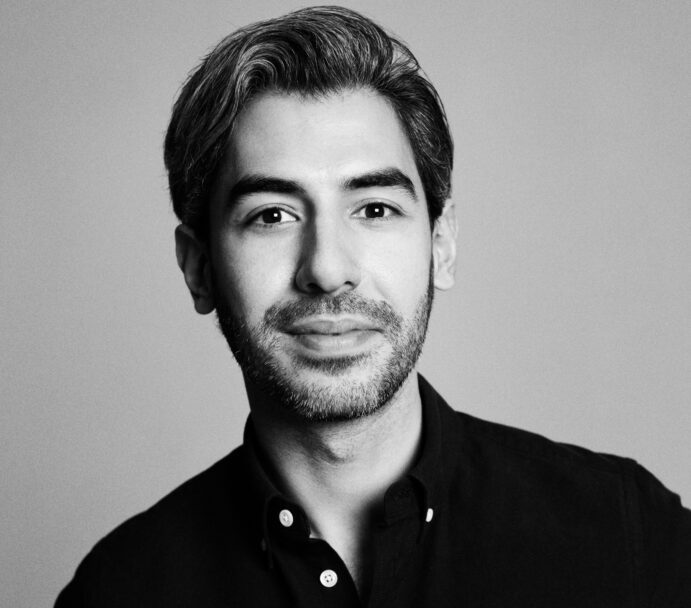Parham Benisi became a partner of the newly formed unit Pophouse Investments in October 2021. He is based in London where the group is quickly expanding its presence. Parham is a part of the Swedish House Mafia catalogue investment team, and a board member at PodX, a global podcast rights company co-owned by Pophouse. After a decade at Morgan Stanley, Rothschild, and – most recently – Verdane, he reflects on his recent entry into the global entertainment industry.

Having worked in investment banking and private equity, what drew you to Pophouse Investments?
“First of all, music has always been a huge part of my life, even though I am not much of a musician. So Pophouse offers a way to combine a personal interest with my professional skills and experience. Pophouse as a company is also one of a kind, and constantly evolving. It is amazing to be a part of, and working near people like Conni Jonsson, Björn Ulvaeus, and Swedish House Mafia is just fantastic. It was an opportunity too exciting to turn down.”
“I was also attracted to being part of something entirely new. We are shaping a new model for investing in artists and brands. From a finance perspective, we are shaping a new asset class. It is a fascinating development to be in the epicentre of.”
In what ways is Pophouse different from your previous experiences?
“It is different in the sense that I’ve always worked in purely financial environments. Here you have the investing element but also a very tangible creative element. It is great to be part of that mix. There are a lot of new impressions and new ways of thinking, from people with different experiences. Some of the people I work closely with come from Spotify, Universal and the Harry Potter Wizarding World for instance, which are different worlds compared to my own background. I have never been exposed to so many varying backgrounds and opinions before as I am here.”
And how is it similar?
“It is equally goal-oriented and results-driven to where I come from. I have always been working with brilliant people and that still holds.”
“But then Pophouse has the benefit of hosting people of more diverse backgrounds and experiences. Pophouse has been around for quite a while but our investment team is like a start-up. I haven’t been part of starting something up before, so it feels very exciting.”
What is your investment scope? Which categories of investments is Pophouse interested in?
“Primarily, we want to invest in entertainment intellectual property, or IP. The majority of what we want to do is music IP. We think that developing and nurturing IP will be a great strategy in the long run. We at Pophouse are uniquely positioned to amplify IP, as we are proving with ABBA Voyage. We can make these things happen by collaborating in unconventional structures.”
“We have a great opportunity to do that with other brands. We will work with iconic artists, and those who have the potential to be iconic. The latter category is artists who are already well-known globally, but with brands that are underdeveloped.”

What has surprised you as you dug into the music industry?
“I expected it to be very relationship-driven, that everyone would know everyone. It has surprised me how much that was true, it’s all about who you know. You can’t just call people for introductions, relationships are everything, it is very trust-driven.”
“It is also exceptionally forward-thinking. Not a day goes by without us discussing new formats and technologies, and how they might impact us and IP rights in the future. In some areas I am probably learning more about new technologies at Pophouse than in my old role as a tech investor!”
There are plenty of investors in music rights. What is Pophouse’s competitive edge?
“Most investors have a more passive approach, and look to acquire rights mostly on the publishing side, without really investing in the brand. We take more of an active management approach, leveraging brand building to really invest in the artist or bands and their brands to increase the value of their catalogues. This is a new angle to music investing. I am sure more companies will do it going forward. But now we are one of the few, if not the only ones, that are really doing it. We don’t only want to promote key events like album releases and world tours, but really help develop and promote artists’ core brand identity. That is the core idea of Pophouse.”
How do you evaluate investment prospects, what are you looking for?
“We are not looking for new artists, but for globally well-known ones. They should have a global appeal, not only be big in Europe or the US, but across continents. And we are looking for great stories to tell. As I said before, they are either iconic artists or artists who have the potential to become iconic. It can be across any type of music genre or any type of artist. As long as we match what they stand for and see huge potential in their brand identity.”
What are you trying to learn more about right now, on both a professional and personal level?
“On a professional level, I’m still trying to learn the ins and outs of the music business. It is very interestingly structured. On the legal side, many of the agreements between artists and labels and others were created before streaming. Then the conditions completely changed with streaming, but many of the structures still reflect a pre-streaming world.”
“So I am both learning how the industry was shaped to become the way it was before streaming, how it is trying to adapt today, and how it might change going forward. This has led me to lots of interesting learnings and discussions on IP ownership, the distribution of it and how this might change with technologies like blockchain in the NFT and Web3 era.”
“Personally, at the moment I am reading quite a lot about human behaviour and the drivers behind our desire to do things. From learning about how the brain functions, to what it is that makes us want more, as opposed to appreciating what we already have. It comes down to what brings us happiness. It is all quite philosophical.”
